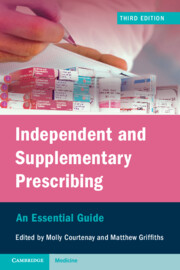Book contents
- Frontmatter
- Contents
- List of Contributors
- Foreword
- Preface
- 1 Non-Medical Prescribing: An Overview
- 2 Non-Medical Prescribing in a Multidisciplinary Team Context
- 3 Consultation Skills and Decision Making
- 4 Legal Aspects of Independent and Supplementary Prescribing
- 5 Ethical Issues in Independent and Supplementary Prescribing
- 6 Psychology and Sociology of Prescribing
- 7 Applied Pharmacology
- 8 Monitoring Skills
- 9 Promoting Concordance in Prescribing Interactions
- 10 Evidence-Based Prescribing
- 11 Extended/Supplementary Prescribing: A Public Health Perspective
- 12 Calculation Skills
- 13 Prescribing in Practice: How It Works
- 14 Minimising the Risk of Prescribing Error
- 15 Education and Training to Become a Prescriber
- 16 Antimicrobial Prescribing
- Index
4 - Legal Aspects of Independent and Supplementary Prescribing
Published online by Cambridge University Press: 23 December 2021
- Frontmatter
- Contents
- List of Contributors
- Foreword
- Preface
- 1 Non-Medical Prescribing: An Overview
- 2 Non-Medical Prescribing in a Multidisciplinary Team Context
- 3 Consultation Skills and Decision Making
- 4 Legal Aspects of Independent and Supplementary Prescribing
- 5 Ethical Issues in Independent and Supplementary Prescribing
- 6 Psychology and Sociology of Prescribing
- 7 Applied Pharmacology
- 8 Monitoring Skills
- 9 Promoting Concordance in Prescribing Interactions
- 10 Evidence-Based Prescribing
- 11 Extended/Supplementary Prescribing: A Public Health Perspective
- 12 Calculation Skills
- 13 Prescribing in Practice: How It Works
- 14 Minimising the Risk of Prescribing Error
- 15 Education and Training to Become a Prescriber
- 16 Antimicrobial Prescribing
- Index
Summary
This chapter discusses the political, professional and legal aspects of non-medical prescribing from its inception in the 1990s to the present day. It considers important legal cases that illustrate the key issues of autonomy, negligence and consent and illustrates how these scenarios can impact on prescribing practice on a daily basis. The role of professional regulators is highlighted and the notion that patients/clients are no longer subservient to benign medical paternalism but rather are seen as consumers of healthcare is considered. New educational aspirations are mentioned with a reliance on evidenced-based practice and a holistic humanised approach to care delivery
Keywords
- Type
- Chapter
- Information
- Independent and Supplementary PrescribingAn Essential Guide, pp. 37 - 49Publisher: Cambridge University PressPrint publication year: 2022

